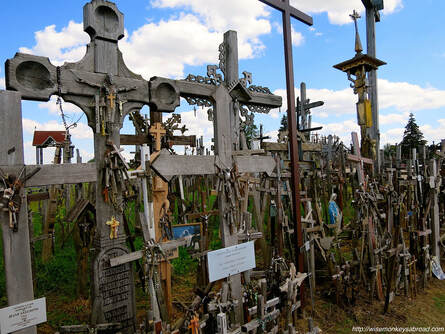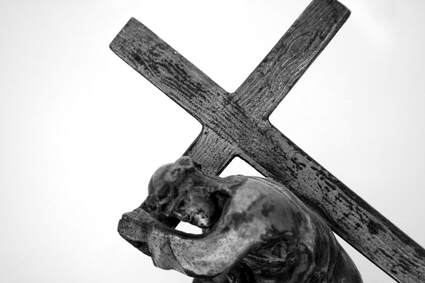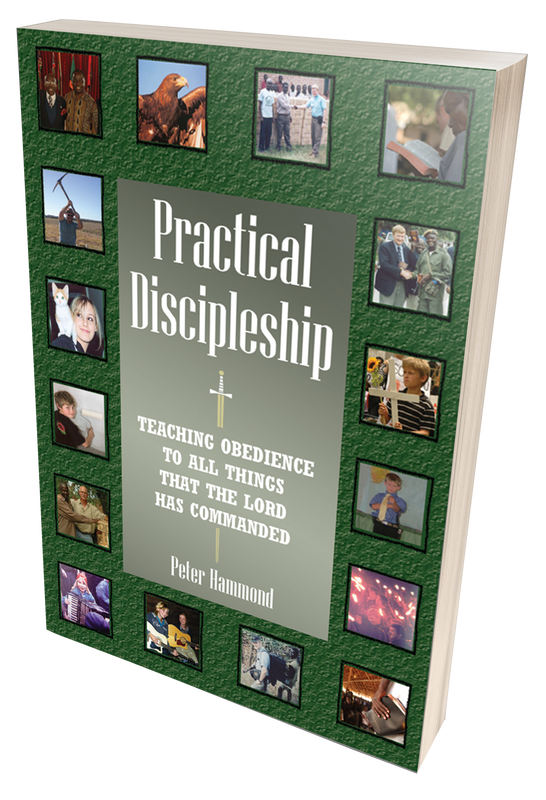
"The message of the Cross is foolishness to those who are perishing, but to us who are being saved it is the power of God." 1 Corinthians 1:18
All too often the Cross is seen as the "national flag" of the church. The Cross was never meant to be the mere nostalgic symbol of a religious system. Neither is the Cross a signpost. The Cross was not meant to just re-direct our lives, but to end them. The Cross was not an ornament, but an instrument of death! Life Out of Death The cross was used by the Romans in the same way as people have use the gallows, the guillotine, a gas chamber, an electric chair, or a firing squad. The Cross in the Bible is an instrument of death, yet out of it has come life. It was meant to be the sign of a curse, but it has become a symbol of God's blessing. It should have signified defeat, yet through it Christ achieved a triumphant victory. Christ has turned that instrument of destruction into the means of salvation. 
The Centrality of the Cross
When the Apostle Paul summarised the essential basics of the Good News, he put it this way: "For what I received I passed on to you as of first importance: that Christ died for our sins according to the Scriptures." 1 Corinthians 15:3 The centre of the Christian Gospel is the Cross and the salvation that God wrought on the Cross is the greatest act in all the history of mankind. It is no wonder that Paul could say: "When I came to you, my brothers… I made up my mind to forget everything except Jesus Christ and especially His death on the Cross." 1 Corinthians 2:1,2 The Necessity of the Cross Although God did not have to save anyone, consequent upon the fact that He determined to do so, it was essential that it involved Atonement. 1. God is Holy and He cannot overlook sin. His justice must be maintained. "God presented Him as a sacrifice of Atonement, through faith in His Blood. He did this to demonstrate His justice, because in His forbearance He had left the sins committed beforehand unpunished - He did it to demonstrate His justice at the present time, so as to be the One who justifies the man who has faith in Jesus." Romans 3:25-26 2. God's Law is immutable and His Holy Nature demands punishment of sin. "God's curse on anyone who does not obey all of God's Laws and teachings." Deuteronomy 27:26 3. God had declared that the penalty for sin would be death. "The soul who sins is the one who will die." Ezekiel 18:4 "For the wages of sin is death." Romans 6:23 4. Christ taught His disciples that the Atonement was necessary. "These are the very things I told you about while I was still with you: everything written about Me in the Law of Moses, the writings of the Prophets and the Psalms had to come true… this is what is written: the Messiah must suffer and must rise from death three days later." Luke 24:44-46 
The Major Theories of the Cross
The Ransom theory. Origen (185-254 A.D.) maintained that through our sin we were slaves of the devil (1 John 3:8) and that Christ paid His life as a ransom to the devil in order to set us free. The Satisfaction theory. Anselm (1033-1109) developed the idea of Christ voluntarily discharging man's obligation to God in order to satisfy God's honour, which had been offended by our sin. The Moral Influence theory. Abelard (1079-1142) argued that Christ's birth, passion and death reveal God's infinite love for mankind and awaken in us a reciprocal love and gratitude, which leads us, back to God. The Example theory. Socinus (1539-1604) held the view that Christ's death provided us with an example of unselfish martyrdom and if we follow His teachings and example then our problems would be over. The Governmental theory. Grotius (1583-1645) saw the Lord's death on the Cross as the manifestation of Divine justice. God's gracious pardon of offenders had to be accompanied by some exhibition of the high estimate that God sets upon His Law and the heinous guilt of violating it. The Penal Substitutionary theory. Calvin (1509-1564) presented the Atonement as an act of redeeming love whereby God takes on Himself in Christ the judgement and penalty of our sin, so obtaining for us pardon for all guilt and the free gift of righteousness before God through faith in Christ as our sin-bearer. Inadequate All of the above views have elements of the truth, but - with the exception of the last theory - they may be considered to be inadequate in varying degrees. Ransom Christ, by His death on the Cross, did give His life as a ransom for our sins, but He did not pay it to the devil. Reconciliation Christ did make full satisfaction for our sins, but "God was in Christ reconciling the world to Himself." God was the initiator; it was because He "so loved the world that He gave His only begotten Son." Redeeming Love Christ's death does reveal His infinite love for mankind and awaken in us a reciprocal love (2 Corinthians 5:14), but that is not the basis of our acceptance before a Holy God. Perfect Example Our Lord did provide us with a perfect example to follow by His obedience even unto His death on the Cross (Philippians 2:8; 1 Peter 2:21), but we are saved by His vicarious sacrifice, not by His example. Atonement It is also true that Christ, through His death on the Cross, overcame the world (John 16:33); disarmed the powers and authorities; making a public spectacle of them; triumphing over them by the Cross (Colossians 2:15); that Christ destroyed the work of the devil (1 John 3:8); and set us free (Hebrews 2:14, 15). Yet we were not only victims of Satan needing deliverance and liberation, we are also guilty sinners needing forgiveness. Total Depravity "As it is written: 'there is no one righteous, not even one; there is no one who understands, no one who seeks God. All have turned away, they have together become worthless; there is no one who does good, not even one…' for all have sinned and fall short of the glory of God." Romans 3:10-12, 23 
The Work of the Cross
All people are guilty sinners, abiding under the wrath of God, alienated from God and in bondage to sin and Satan. Yet, all these problems were solved by Christ in His death on the Cross. Vicarious By Christ's perfect obedience to the whole moral Law and to all the commandments He fulfilled the just requirements of a Holy God. In His passive obedience to God's Will, Christ submitted to the penal sanctions of the Law and willingly endured all sufferings for the sake of His people. Salvation There are four New Testament words which express distinct facets of Salvation in Christ: Sacrifice, Propitiation, Reconciliation and Redemption. 1. Sacrifice Throughout the Old Testament redemption is connected with the shedding of Blood and with a form of substitution. When Abel killed the firstborn of his flock as a sacrifice (Genesis 4:4), he symbolised several important truths: (a) sin must be judged; (b) a price must be paid for sin; (c) the innocent must die for the guilty; and (d) without the shedding of Blood there is no forgiveness of sins. When Abraham was instructed to kill his only son, God provided a substitute to die in place of Isaac (Genesis 22:8). This foreshadowed the time when God would show His love for us by sending His own beloved Son as a sacrifice to die in our place for our sins. At the Passover God delivered His people from both the bondage of slavery and from the danger of death through the shed Blood of the sacrificial lambs (Exodus 12). In this powerful picture of God's Redemption of His people, we can see a type of the Lamb of God. For "Christ our Passover Lamb has been sacrificed" 1 Corinthians 5:7, in order to deliver us from the bondage of sin and from the sentence of death. The prophet Isaiah described in detail the future sacrifice of Christ: "He was pierced for our transgressions, He was crushed for our iniquities, the punishment that brought us peace was upon Him, and by His wounds we are healed… the Lord has laid on Him the iniquity of us all… For the transgression of my people He was stricken… and the Lord makes His life a guilt offering… My Righteous Servant will justify many and He will bear their iniquities." Isaiah 53:5-11 The New Testament era begins with John the Baptist pointing to Jesus and proclaiming: "Look, the Lamb of God, Who takes away the sin of the world!" John 1:29 Jesus is our Passover lamb (1 Corinthians 5:6-8); our sin offering (Romans 8:3); our atonement (Romans 3:25). When Christ, the perfect Son of God, a Lamb without spot or blemish (1 Peter 1:19) shed His precious Blood on the Cross it was a substitutionary death. He died for us, in our place (1 Peter 3:18), the innocent for the guilty, the just in the place of the unjust. He became like us - that we might become like Him. He was rejected - that we might be accepted. He was condemned - that we might be forgiven. He was punished - that we might be pardoned. He suffered - that we might be strengthened. He was whipped - that we might be healed. He was hated - that we might be loved. He was crucified - that we might be justified. He was tortured - that we might be comforted. He died - that we might live. He went to hell - that we might go to heaven. He endured what we deserve - that we might enjoy what only He deserves. 2. Propitiation While the "Sacrifice" aspect of Christ's work on the Cross deals with our guilt, this aspect of "Propitiation" refers to Christ's covering of our sin in order to remove the Divine wrath which our sin evokes. God's wrath is that Holy revulsion of the Godhead against all sin and evil. Christ's propitiation is none other than God Himself taking upon His own holy and eternal heart the implications of His own wrath. "He is the propitiation for our sins." 1 John 2:2 "This is love: not that we loved God, but that He loved us and sent His Son as an atoning sacrifice for our sins." 1 John 4:10 Through His death on the Cross, Christ removed the wrath of God, which was abiding over us, by covering over our sins. By removing our guilt, Christ saved us from God's wrath. 3. Reconciliation Reconciliation means the abolition of enmity between two parties who have quarrelled. "But God demonstrates His own love for us in this: While we were still sinners, Christ died for us. Since we have now been justified by His Blood, how much more shall we be saved from God's wrath through Him! For if, when we were God's enemies, we were reconciled to Him through the death of His Son, how much more, having been reconciled, shall we be saved through His life! Not only is this so, but we also rejoice in God through our Lord Jesus Christ, through whom we have now received reconciliation." Romans 5:8-11 On the Cross, Christ's love dealt sacrificially with the implications of our sin and gave us "peace with God." Romans 5:1 "For God was pleased to have all His fullness dwell in Him and through Him to reconcile all things… by making peace through His Blood, shed on the Cross." Colossians 1:19, 20 Reconciliation is God's work: "God was in Christ reconciling the world to Himself." 2 Corinthians 5:19. Our sin had made us enemies of God and it was necessary that Christ should make peace between us by dealing with the cause of the enmity, our sin, on the Cross. 4. Redemption Redemption is the language of purchase and ransom. Because of our bondage to sin, Christ died to set us free. Christ gave His life "as a ransom for many" (Mark 10:45). A ransom is the price paid in order to secure a release. The sinner has been bound to the law of sin and death. "Christ redeemed us from the curse of the law by becoming a curse for us." Galatians 3:13 Christ has redeemed us from the necessity of keeping the Law as the condition of acceptance before God. "For just as through the disobedience of the one man the many were made sinners, so also through the obedience of the One Man the many will be made righteous." Romans 5:19 Our Redemption from sin embraces several aspects: † JUSTIFICATION - Colossians 1:14 We were redeemed from the Penalty of our sins. This deals with our guilt. We are fully forgiven for our sins. † SANCTIFICATION - Titus 2:14 We are being redeemed from the Power of our sin. This deals with our nature. We are progressively delivered from our sin. † GLORIFICATION - Romans 8:23 We shall be redeemed from the Presence of all sin. This deals with the very presence of sin. We shall be eternally freed from sin. "We wait for the blessed hope - the glorious appearing of our Great God and Saviour, Jesus Christ, who gave Himself for us to redeem us from all wickedness." Titus 2:13 "God our Saviour… wants all men to be saved and to come to a knowledge of the truth… Christ Jesus gave Himself as a ransom for all men." 1 Timothy 2:4-6 "He is the atoning sacrifice for our sins and not only for ours but also for the sins of the whole world." 1 John 2:2 "You are worthy… because You were slain and with Your Blood You purchased men for God from every tribe and language and people and nation." Revelation 5:9 Dr. Peter Hammond Africa Christian Action PO Box 23632 Claremont 7735 Cape Town South Africa Tel: 021-689 4481 Fax: 086-494-8070 E-mail: [email protected] Web: www.christianaction.org.za See also: The Illegal Trial of Jesus and the Verdict of History (for a PowerPoint with pictures, click here.) The Blood of Christ (for the audio, click here.) Who Killed Jesus? (for a PowerPoint, click here; for the tract, click here.) How Can I Know that Jesus is the Messiah? (for the tract, click here.) Christ is Risen Indeed! (for a PowerPoint, click here; for the tract, click here.) The audio CD of this message and other Livingstone Fellowship sermons and Reformation Society lectures are available from: Christian Liberty Books, P O Box 358 Howard Place 7450, Cape Town South Africa, Email: [email protected], Website:www.christianlibertybooks.co.za.
1 Comment
|
DiscipleshipArticles
All
Archives
May 2023
|


 RSS Feed
RSS Feed